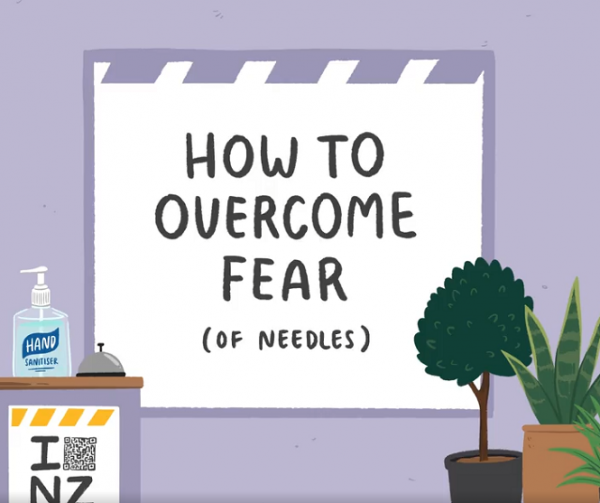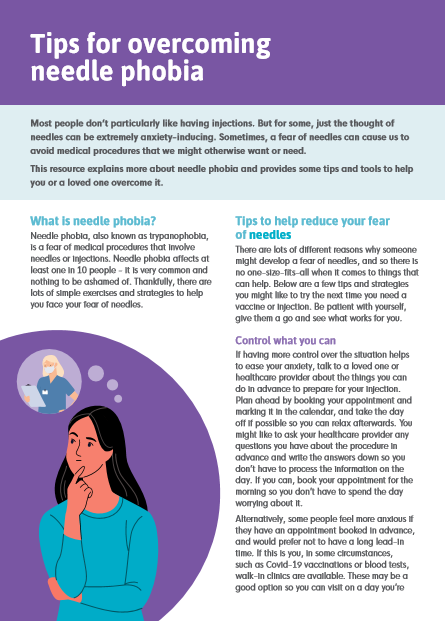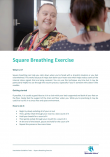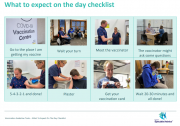You can now add Healthify as a preferred source on Google. Click here to see us when you search Google.
Fear of needles and injections
Key points about injection and needle phobia
- The fear of needles and injections is quite common.
- It may affect you if you are having a blood sample taken, are given a vaccine or are taking some medicines like insulin.
- Some people feel extremely anxious just thinking about or seeing needles and injections.

Some people feel extremely anxious just thinking about or seeing needles and injections. This anxiety means you might avoid having blood tests and vaccinations.
Some people with a fear of needles may have bad memories from a previous experience of having blood tests or procedures, but this anxiety can occur even without that memory. Or it may be the sight of blood that makes you feel anxious or upset.
As well as feeling anxious, other symptoms can include changes in your blood pressure, feeling faint, sweating or an increased heart rate.
The good news is that there are things you can do to help with feeling anxious. Try these tips to help you manage the next time you need to have a blood test or vaccination by needle, or inject yourself with medicine.
Don’t be ashamed of being scared of injections – you are not alone
Being anxious about injections and needles is very common, affecting at least one in 10 people. It is nothing to be ashamed of.
Tell healthcare providers about your worries
Tell the person coordinating your care, giving you the injection or doing a blood test about your worries. They can answer your questions and help you cope with the procedure, eg, by chatting to distract you. They will not be annoyed or think you are weak. Take your time and ask all the questions you need to. They would like to know your concerns so they can help to make it easier for you.
Remember it won't hurt that much
Remind yourself that the needle or injection will not be unbearably painful. It will only hurt a little.
Plan ahead to reduce worry
Try to book your appointment for first thing in the morning so you don't spend the whole day worrying about it.
Learn relaxation techniques
It is useful to know how to get into a relaxed state before going into a situation that makes you feel anxious. This means practising a relaxation technique when you are not in that situation. You may like to try progressive muscular relaxation, breathing exercises or mindfulness meditation. Just choose a method of relaxation that suits you.
Build a support team
If your anxiety is about an injection that you have to give yourself, such as insulin, get some support. Having a caregiver or a member of your whānau give you the injection may be easier, or they can offer support while you inject your medicine yourself. Ask your doctor about training a friend, family/whānau member or another caregiver to inject your medicine.
Distraction techniques
Distract yourself by focusing on something else. You can try focusing on a fixed point in the room and studying it intensely. Watching a video or reading on your phone can also help.
Applied tension
Applied tension is a simple practice to increase blood pressure back to normal levels to prevent you from fainting. Find information about how to do this exercise.(external link)
Remember why you’re doing this
Pause and remind yourself of how this injection will help you.
If you’re anxious about injecting your medicine, remember that even if it makes you uncomfortable for a few moments, treating your condition is important for your health. If you need to have a blood test, remind yourself how important it is to be diagnosed so you can have any treatment you need to stay well. And if you are having a vaccine by injection, remember that you are helping protect yourself and your loved ones.
Click the image below to visit the website, scroll down to see the video, then click play. (external link)
(external link)
(Unite against COVID-19, NZ)
Get help
If you think that needle or injection phobia prevents you from getting treatment for your health, ask your doctor for a referral to a mental health provider. Also see oVRcome, a self-help virtual reality (VR) app specifically phobias including needle phobia.
Resources
5 questions to ask about your medications(external link) Health Quality and Safety Commission, NZ, 2019 English(external link), te reo Māori(external link)
References
- Overcoming your needle phobia (fear of needles)(external link) NHS, UK, 2020
- About phobias(external link) Mental Health Foundation, NZ
- Anxiety(external link) Anxiety NZ
Brochures

Mental Health Foundation, NZ

Square breathing exercise
Healthcare New Zealand, 2021

What to expect on the day checklist
Healthcare New Zealand
Credits: Healthify He Puna Waiora editorial team. Healthify is brought to you by Health Navigator Charitable Trust.
Reviewed by: Maya Patel, MPharm PGDipClinPharm, Auckland; Dr Dr Adrienne Embler, Clinical Psychologist, Waikato
Last reviewed:
Page last updated:





